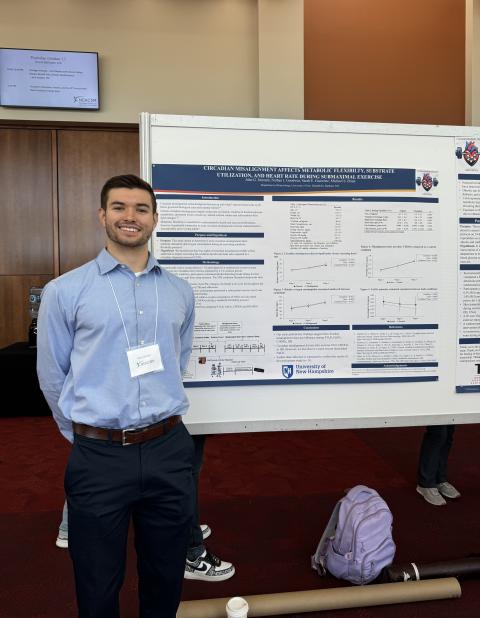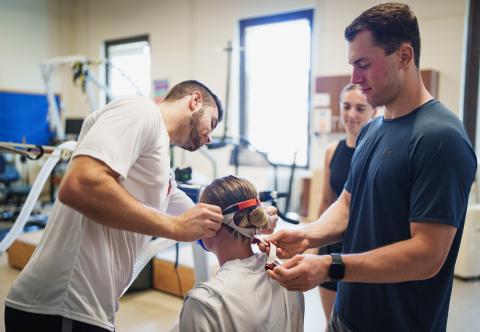Turning Curiosity into Career Through Research

Before coming to UNH, Gabe Dennett ‘25 didn’t expect to help run clinical trials or co-author research papers.
But after stepping into the Robert Kertzer Exercise Physiology Laboratory at New Hampshire Hall, he discovered that data and scientific terms are just puzzle pieces—each one helping to tell the story of how small lifestyle changes can shape long-term health. And for Dennett, putting that puzzle together is fun.
Through his research, Dennett, an exercise science major, has developed hands-on skills in data collection, exercise testing, and lab techniques like centrifuging and glucose analysis.
“I’m really interested in the methods—the data collection, the exercise testing, how it all works,” Dennett says. “But also, what can you do with that data afterward? How do you explore it? There’s a story behind the numbers—about what’s happening physiologically and what it tells us about our health.”
Digging Into the Research
Under the mentorship of Assistant Professor Michael Brian, Dennett got involved in research during his sophomore year, contributing to a study on post-meal walking and glucose control in inactive young women—a project that led to a published paper he co-authored with Brian and others. He also helped collect performance and training load data for the UNH Women’s Soccer team over the course of the season.

As Brian's research assistant, Dennett played a key role in a study aimed at modeling how an obesogenic lifestyle can rapidly impact blood glucose regulation. In simpler terms, the research explored how just 10 days of inactivity and increased sugar consumption can disrupt the body’s ability to manage blood sugar, even in healthy, active individuals.
Dennett helped implement the 10-day intervention, which included monitoring participants, collecting blood samples, and assisting with data analysis. The study divided participants into three groups: one that maintained normal activity levels, one that significantly reduced physical activity (fewer than 5,000 steps per day), and one that reduced activity while also increasing carbohydrate intake.
By the end of the intervention, researchers observed early indicators of insulin resistance—when the body starts having trouble regulating blood sugar—especially in the group with both reduced activity and added sugar.
“Ten days is not that long. People go on vacations for 5-10 days and cut down on their activity,” Dennett says. “This was a safe study with healthy people that could bounce back quickly, but it shows how quickly you can go down the wrong path if you don’t take any action.”
Dennett says the findings are especially relevant for those going through a lifestyle change—especially college students and young professionals.
“In high school, routines and sports keep you active, and food choices are more structured,” Dennett says. “But in college—and after—you have more freedom, less time, tighter budgets, and that’s when unhealthy habits can start creeping in. That’s when you start to see a drop in physical activity and diet quality.”
Dennett's research continued in summer 2024 through a Summer Undergraduate Research Fellowship (SURF) from the Hamel Center for Undergraduate Research. He and classmate Nate Goodwin studied how small shifts in sleep patterns—moving bedtimes just an hour earlier or later—can impact heart health and metabolism.
While Goodwin focused on heart rate and blood pressure, Dennett examined how the body uses fuel—specifically fat and carbohydrates—at rest and during exercise.
Although the study didn’t reach statistical significance due to a small sample size, early data suggested that participants with disrupted sleep began burning sugar earlier during exercise instead of relying on fat, the body’s preferred fuel at low intensity.
“That shift suggests the body’s losing some of its flexibility to switch between energy sources,” Dennett explains. “Over time, that can lead to insulin resistance, weight gain, and other metabolic issues. And once people start feeling those changes—especially if they’re not already active—it can be tough to get back on track.”
Continuing His Research Journey
After graduation, Dennett will complete an internship with the U.S. Army Research Institute of Environmental Medicine in Natick, Massachusetts, working in their military nutrition division studying sex-specific differences between female and male warfighters.
Following his internship, he'll head to the University of Montana as a teaching assistant, teaching exercise physiology while continuing his research path toward a master's degree and potentially a PhD.
“Research is one of the best ways to explore your own curiosities. I think it’s a way to pursue a career that doesn’t even feel like work,” Dennett says. “As researchers, we contribute to science and expand our understanding for the good of everyone—but at the same time, selfishly, it’s also stuff I want to know for myself, the people in my life, and my community. It’s a nice way to make a broad impact while diving into what you care about.”